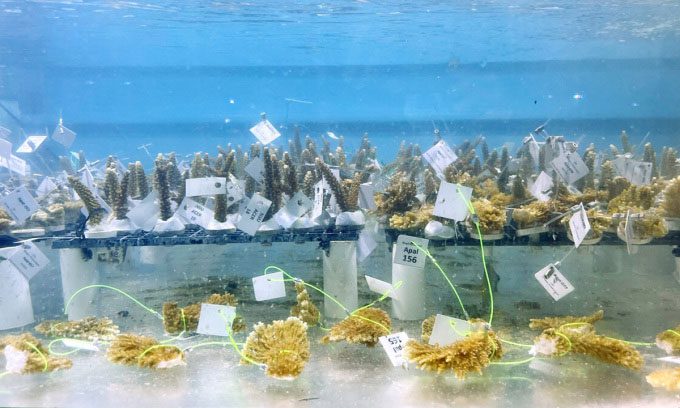Record high sea temperatures off the coast of Florida are prompting experts to bring corals from underwater nurseries to cooler onshore tanks.
Sea temperatures off Florida reached unusually high levels in July, posing a serious threat to coral reefs, Science Alert reported on July 31. “Warm water is not good for any marine life, whether it be corals, fish, or lobsters. Therefore, there is a risk of mass die-offs of fish and sea turtles, among other similar phenomena,” said Alex Neufeld, project coordinator at the Coral Restoration Foundation.

Natural coral samples safely stored in the living gene bank at The Reef Institute, Florida. (Photo: The Reef Institute)
Surface water temperatures in Florida have risen above 32.2 degrees Celsius in the first few days of July. On July 24, temperatures in Manatee Bay even reached 38.4 degrees Celsius. Meanwhile, corals typically thrive in water temperatures around 21 – 28.8 degrees Celsius.
Neufeld’s nonprofit organization is collaborating with several local groups to collect coral samples from underwater nurseries and transport them to onshore facilities, where water parameters can be controlled to protect the corals.
The rate of coral bleaching in Florida also seems to have accelerated this year. Bleaching occurs when corals become stressed and expel the symbiotic algae living within them, which provide nutrients and color.
According to the National Oceanic and Atmospheric Administration (NOAA), Florida’s coral reefs contribute $2 billion to the local economy, generating 70,400 full-time and part-time jobs. While business owners are worried about their livelihoods, Neufeld and many other scientists are busy finding ways to collect coral samples from nurseries. “We have taken representative samples of various coral species and moved them to different locations for better protection, while also growing additional specimens as a backup for these endangered species,” he said.
The work of these scientists is not only essential for protecting coral reefs but also indirectly safeguarding humans. Coral reefs serve as habitats for many marine animals and act as a critical barrier against storms and tidal surges, which are becoming increasingly severe due to global warming.


















































